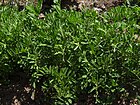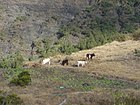Note: This is a project under development. The articles on this wiki are just being initiated and broadly incomplete. You can Help creating new pages.
Lens culinaris
Lens culinaris is a much-branched, erect, bushy, annual plant growing 30 - 80cm tall. Lentil is one of the oldest pulse crops and is of ancient cultivation in western Asia, Egypt and southern Europe. It probably originated in western Asia, from where it eventually spread throughout temperate and subtropical regions of the world and into the higher elevations in tropical areas.
Contents
- 1 Uses
- 2 Parts Used
- 3 Chemical Composition
- 4 Common names
- 5 Properties
- 6 Habit
- 7 Identification
- 8 List of Ayurvedic medicine in which the herb is used
- 9 Where to get the saplings
- 10 Mode of Propagation
- 11 How to plant/cultivate
- 12 Commonly seen growing in areas
- 13 Photo Gallery
- 14 References
- 15 External Links
Uses
Constipation, Intestinal affections, Ulcers.[1]
Parts Used
Chemical Composition
Common names
| Language | Common name |
|---|---|
| Kannada | |
| Hindi | |
| Malayalam | |
| Tamil | |
| Telugu | |
| Marathi | |
| Gujarathi | |
| Punjabi | |
| Kashmiri | |
| Sanskrit | |
| English |
Properties
Reference: Dravya - Substance, Rasa - Taste, Guna - Qualities, Veerya - Puotency, Vipaka - Post-digesion effect, Karma - Pharmacological activity, Prabhava - Therepetics.
Dravya
Rasa
Guna
Veerya
Vipaka
Karma
Prabhava
Habit
Identification
Leaf
| Kind | Shape | Feature |
|---|---|---|
Flower
| Type | Size | Color and composition | Stamen | More information |
|---|---|---|---|---|
| {{{5}}} |
Fruit
| Type | Size | Mass | Appearance | Seeds | More information |
|---|---|---|---|---|---|
Other features
List of Ayurvedic medicine in which the herb is used
Where to get the saplings
Mode of Propagation
How to plant/cultivate
Lentils can be cultivated from the temperate zone to the tropics, so long as there is a growing season of 4 months or more with a fairly dry period as the seed is ripening.[4]
Commonly seen growing in areas
[[:Category:Herbs that are commonly seen in the region of |]], [[:Category:Herbs that are commonly seen in the region of |]], [[:Category:Herbs that are commonly seen in the region of |]], [[:Category:Herbs that are commonly seen in the region of |]], [[:Category:Herbs that are commonly seen in the region of |]].
Photo Gallery
References
- ↑ Indian Medicinal Plants by C.P.Khare
- ↑ [Chemistry]
- ↑ [Morphology]
- ↑ Cultivation
External Links
- Ayurvedic Herbs known to be helpful to treat Constipation
- Ayurvedic Herbs known to be helpful to treat Intestinal affections
- Ayurvedic Herbs known to be helpful to treat Ulcers
- Herbs with Seeds used in medicine
- Herbs with Young seedpods used in medicine
- Habit - Annual
- Index of Plants which can be propagated by Seeds
- Herbs that are commonly seen in the region of
- Herbs
- Pages without herbs images




